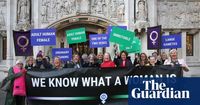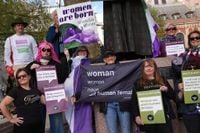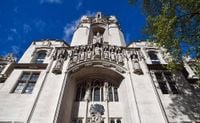In a landmark ruling that has stirred intense debate, the U.K. Supreme Court unanimously decided on April 16, 2025, that transgender women do not fall under the legal definition of "women" as outlined in the Equality Act of 2010. This decision, which specifies that the term "sex" refers exclusively to biological women, marks a significant shift in the legal landscape concerning gender identity and rights in the U.K.
The ruling arose from a legal challenge initiated by the campaign group For Women Scotland (FWS), which argued that the inclusion of transgender women in the definition of women could undermine sex-based rights and protections. Backed by notable figures, including author J.K. Rowling, FWS contended that allowing trans women to be classified as women under the law could lead to substantial implications for female representation and access to women-only spaces.
During the court proceedings, Lord Patrick Hodge, Deputy President of the Supreme Court, emphasized that extending the definition of "woman" to include those with gender recognition certificates (GRCs) would create practical difficulties in the application of the law. He stated, "If sex did not only mean biological sex in the Equality Act, providers of single-sex spaces would face practical difficulties." This ruling means that transgender women will no longer be able to occupy positions on public boards reserved for women, nor will they have guaranteed access to women-only services such as hospitals and shelters.
The Scottish government had previously argued that individuals with GRCs should be recognized as women under the law, thereby affording them the same protections as biological women. However, the Supreme Court's decision has clarified that the legal definition of woman is rooted in biological sex, a stance that has been celebrated by gender-critical campaigners. Trina Budge, director of FWS, remarked, "There's absolute clarity in law regarding what a woman is. When we see a women-only space, it means exactly that. Just women, no men, not even if they have a gender recognition certificate."
Opponents of the ruling, including trans rights activists, have voiced concerns that this decision could further entrench anti-trans sentiments and legislation, particularly in the U.S., where similar disputes are ongoing. Imara Jones, CEO of TransLash Media, warned that the ruling might embolden efforts to narrow legal definitions of gender across the Atlantic. "By ruling that the U.K.’s Equality Act’s definition of woman excludes trans women, the decision will likely boost American efforts to narrow legal concepts of gender—both legally and through regulations," she said.
The implications of this ruling extend beyond the U.K., as it arrives amid rising anti-trans sentiments in the United States, where state legislators have introduced numerous bills targeting transgender rights. On his first day in office in January 2025, President Donald Trump issued an executive order that defined sex strictly as biological, barring transgender individuals from changing their gender markers on federal documents. This has raised alarms about the potential erosion of protections for trans individuals in the U.S. legal system.
In the wake of the ruling, some British politicians have echoed similar sentiments. Parliament Member Rupert Lowe took to social media, stating, "Now - let's keep men out of women's sports and spaces. We must prioritize safety over inclusivity, dignity over wokery, reality over ideology." This reflects a growing movement among certain political factions in the U.K. to reinforce traditional definitions of gender.
The ruling has also sparked discussions about the future of gender-affirming care in the U.K. In May 2024, the National Health Service (NHS) of England announced that puberty blockers would no longer be available for transgender youth, citing insufficient evidence for their effectiveness. This decision has been met with criticism from medical professionals and advocates who emphasize the importance of gender-affirming care.
Amnesty International U.K. expressed disappointment at the Supreme Court's ruling, stating that it could have concerning consequences for trans people. However, they also noted that trans individuals still have protections under the "gender reassignment" category of the Equality Act. Laurel Powell, spokesperson for the Human Rights Campaign, reiterated that "today’s ruling does not change the fact that trans women are women, that trans men are men, and that they deserve to be recognized and protected for who they are. That was true yesterday, and it will be true tomorrow."
The legal dispute that led to this ruling began in 2018 when the Scottish Parliament passed a bill aimed at ensuring gender balance on public boards. The legislation included provisions for recognizing trans women with GRCs as women, which prompted FWS to challenge its legality. After several court battles, the case ultimately reached the Supreme Court, culminating in Wednesday's decision.
Kate Barker, chief executive of the LGB Alliance, hailed the ruling as a "profound relief" and a watershed moment for lesbian rights, emphasizing that the court's decision clarifies that women-only spaces can legally exclude men, regardless of whether they possess a GRC. Meanwhile, Maya Forstater, chief executive of the campaign group Sex Matters, expressed satisfaction with the ruling, stating, "We are delighted that the Supreme Court has accepted the arguments of For Women Scotland and rejected the position of the Scottish Government."
In light of the ruling, many are calling for a reassessment of the Equality Act and its implications for both women and trans individuals. The debate surrounding gender identity and rights is far from over, as both sides prepare for the next chapter in this ongoing legal and societal struggle.







